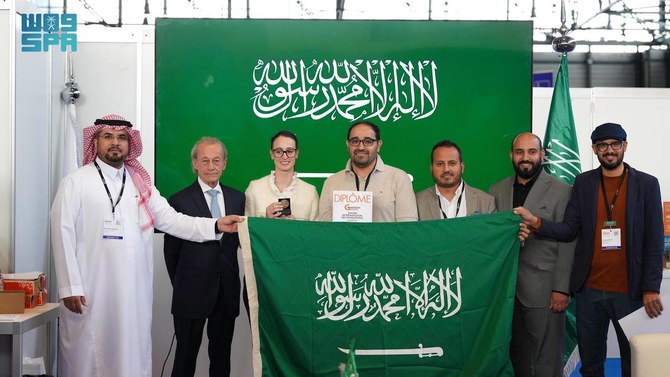JEDDAH: King Abdulaziz University won 17 awards and medals for its innovations at the Geneva International Exhibition of Inventions.
The 26 Saudi universities that entered — 19 public, two independent, and five private institutions — between them displayed 113 inventions in the Kingdom’s pavilion, with applications in various scientific, theoretical, medical and other fields.
Mosab bin Faleh Al-Harbi, spokesperson and director of the KAU media center, said that the competition boosts the importance of scientific research and innovation in academia.
He highlighted the university’s commitment to fostering innovation and research among students, and said that the university’s contributions came from the colleges of computer science, information technology, medicine, and engineering.
Among the awards won by KAU were the National Research Society of Thailand Prize for a date classification application, and the Malaysian Organization for Research Scientists Prize for a continuous monitoring invention.
Jeddah University also took part in the exhibition, winning two bronze awards. These were for a computer-vision-based smart building health inspection system, and a tool for detecting and preventing distributed denial of service attacks (malicious attacks on a network or server).
Qassim University won a silver medal for its system for desalinating water using halophytic plants, developed by a research team from the College of Agriculture and Food Sciences. The university also received a bronze medal for a project to use date palm waste in the production of pharmaceutical excipients in nano-sized tablets, presented by another research team.
Jazan University was awarded two gold medals. Asim Najmi from the College of Pharmacy received a medal for his work on derivatives of benzylidene 4, 2 thiazolidinones, and their use in diabetes treatment. Mohammed Mashiki from the College of Dentistry, meanwhile, won gold for his modification of a dental crown used in endodontic retreatment.
The university’s acting president, Mohammed Abu Rasin, said these achievements show the institution’s dedication to fostering innovation and promoting a culture of invention through consistent support for inventors.
The Geneva exhibition is a major global event, drawing inventors, researchers, and innovators from around the world. It was held from April 17 to 21, and attracted more than 1,000 innovations from over 50 countries.



























